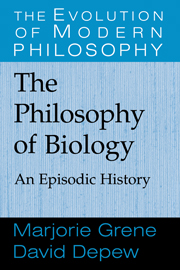Book contents
- Frontmatter
- Contents
- List of Figures
- Notes on Citations and References
- Acknowledgments
- Preface
- 1 Aristotle and After
- 2 Descartes, Harvey, and the Emergence of Modern Mechanism
- 3 The Eighteenth Century I
- 4 The Eighteenth Century II
- 5 Before Darwin I
- 6 Before Darwin II
- 7 Darwin
- 8 Evolution and Heredity from Darwin to the Rise of Genetics
- 9 The Modern Evolutionary Synthesis and Its Discontents
- 10 Some Themes in Recent Philosophy of Biology
- 11 Biology and Human Nature
- 12 The Philosophy of Biology and the Philosophy of Science
- References
- Index
5 - Before Darwin I
A Continental Controversy
Published online by Cambridge University Press: 05 June 2012
- Frontmatter
- Contents
- List of Figures
- Notes on Citations and References
- Acknowledgments
- Preface
- 1 Aristotle and After
- 2 Descartes, Harvey, and the Emergence of Modern Mechanism
- 3 The Eighteenth Century I
- 4 The Eighteenth Century II
- 5 Before Darwin I
- 6 Before Darwin II
- 7 Darwin
- 8 Evolution and Heredity from Darwin to the Rise of Genetics
- 9 The Modern Evolutionary Synthesis and Its Discontents
- 10 Some Themes in Recent Philosophy of Biology
- 11 Biology and Human Nature
- 12 The Philosophy of Biology and the Philosophy of Science
- References
- Index
Summary
Introduction
In the first decades of the nineteenth century, the unquestioned center of work in the life sciences was the Muséum National d'Histoire Naturelle at the Jardin des Plantes in Paris. One of Darwin's early teachers, Robert Grant, spent time there, as did Darwin's friend, and later enemy, Richard Owen. It is an institution worth studying in itself, but the most notorious episode associated with it, on which we will focus here, was the debate in 1830 between two of its professors, Georges Cuvier, by then the unquestioned doyen of French science, and his long-time colleague Etienne Geoffroy St. Hilaire. Their disagreement had been building up for more than a decade, but it came to a head in the spring of 1830. We may put the nub of their quarrel very briefly, before providing a sketch of its historical background, and then returning to analyze their contrasting positions in a little more detail.
Geoffroy was a man of one idea. As early as 1796, at the age of twenty-three, he had written, in an essay on a species of lemur (the “maki” or “macaco”): “It seems that nature has confined itself within certain limits, and has formed all living beings only on one unique plan” (Geoffroy 1796 in Le Guyader 1998, p. 35). Later, Geoffroy was to prefer the expression “unity of composition,” but the thought of looking for widespread unities remained.
- Type
- Chapter
- Information
- The Philosophy of BiologyAn Episodic History, pp. 128 - 153Publisher: Cambridge University PressPrint publication year: 2004

